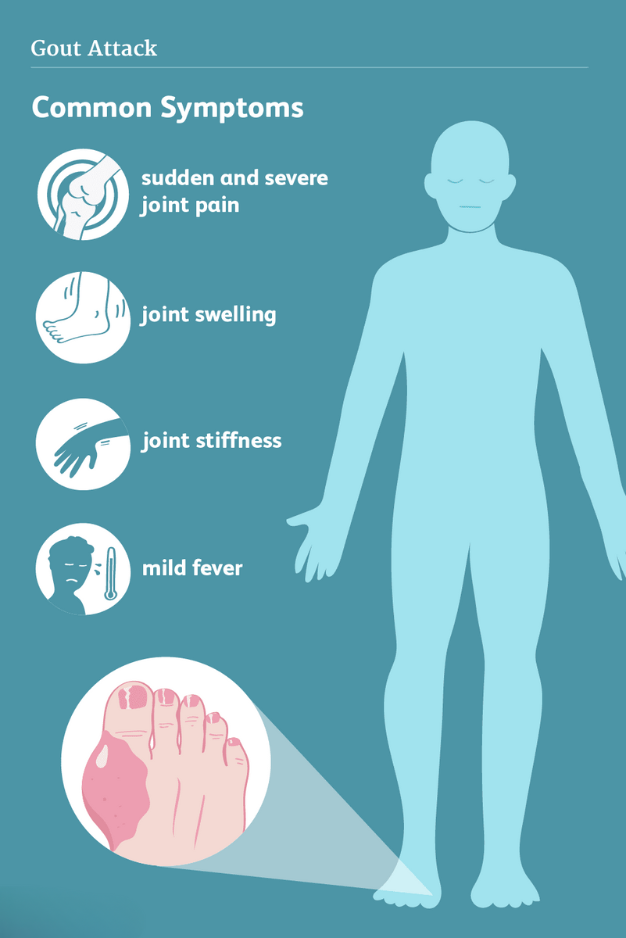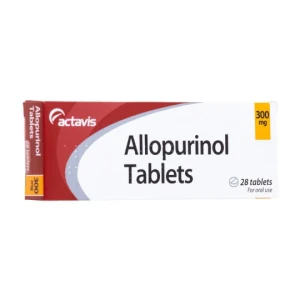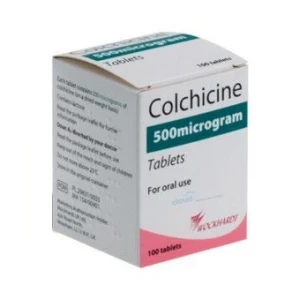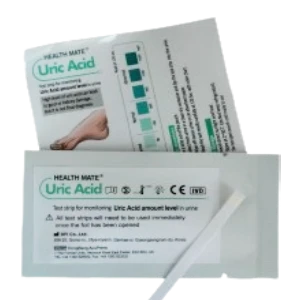Gout
Gout is the most common type of inflammatory arthritis and is thought to affect around 2.5% of the UK population. Its characteristic symptom is sudden, severe pain in one of the big toes, though it can also affect other joints. Gout can be managed with medications and lifestyle changes, but if left untreated, it may lead to serious complications, including permanent joint damage.
We offer a range of Gout treatments. Our online prescribers are on hand to discuss our available products and help you find the right one for you.
Allopurinol
- Decreases uric acid
- Treatment for gout
- Next day delivery
Colchicine
- Treatment For Acute Gout
- Next Day Delivery
- Prescriber Available
Uric Acid Test
- Results In 120 seconds
- Colour Chart Included
- 5 Sealed Tests
What Causes Gout?
Historically, gout was known as ‘the disease of kings’ because of its association with a rich diet and heavy alcohol consumption. As a result, many people believe gout is caused by diet; however, this is a common misconception.
The primary risk factor for gout is hyperuricemia, characterised by an excess of urate (also known as uric acid) in the bloodstream. Urate is a waste material produced during the breakdown of substances called purines, which are abundant in meat, fish, and other types of seafood. Typically, most urate is removed from the body by the kidneys, which excrete it in the urine.
In individuals with gout, the kidneys may not effectively remove urate from the body. If urate levels get too high, tiny urate crystals can start to form in body tissues. When these crystals form in the joints, they can trigger the symptoms of gout.
High urate levels - and, therefore, gout - have a combination of genetic and environmental causes. Researchers have identified over a dozen genetic variants that influence how the body handles urate, so people with certain genes have a higher risk of gout. Changes in hormone levels brought about by menopause in women can also contribute to high urate levels. In rare cases, gout may develop as a result of the body producing excessive urate.
However, high urate levels are unlikely to be the sole cause of gout, as only one in three people with hyperuricemia develops gout. Other factors, such as the amount of fluid in the joints, can also play a role. If the joints don’t contain enough fluid, this may increase the risk of urate crystals accumulating in the joints.
Symptoms of Gout
The most common symptom of gout is sudden, severe pain in one of the big toes. Gout pain typically flares up at night and may be powerful enough to wake you up. Although gout usually affects the toes, it can also occur in the ankles, hands, wrists, elbows, knees, or other joints in the feet. Joints affected by gout may also be red, swollen, stiff, and warm to the touch.

Gout symptoms come and go. Symptomatic episodes (called gout attacks or flares) alternate with periods of remission, in which the patient usually has no symptoms. The frequency of gout attacks can vary significantly; some people experience symptoms every few months, while others can go years between flare-ups.
Complications of Gout
Untreated gout can lead to the formation of tophi, which are hard lumps caused by a build-up of urate crystals under the skin. Tophi usually form on the ears, fingers or elbows, are often painful, and may interfere with everyday activities. Other potential complications of gout include:
- Joint damage
- Kidney stones
- Chronic arthritis
- Reduced quality of life (e.g., due to absence from work and reduced participation in social activities)
Gout is also associated with an increased risk of other serious health conditions, including:
- High blood pressure
- Heart disease and heart failure
- Chronic kidney disease
- Diabetes
- Obesity
Risk Factors for Gout
Some people are at greater risk of high urate levels and gout than others. You are more likely to develop gout if you:
- Are overweight or obese
- Are male
- Have a family history of hyperuricemia and/or gout
- Have a genetic condition associated with high urate levels
- Eat a lot of high-purine foods (like meat, fish, and seafood)
- Drink a lot of alcohol or sugary drinks
- Are menopausal
- Are middle-aged or older
- Use certain medications (such as diuretics, aspirin, and ciclosporin)
Treatment for Gout
Gout can’t be cured, but gout medications and lifestyle changes can help ease symptoms, prevent attacks, and reduce your risk of joint damage and other complications.
Gout flares are usually treated with over-the-counter non-steroidal anti-inflammatory drugs (NSAIDs), like ibuprofen. These can help ease the pain and swelling associated with gout. Gout attacks may also be alleviated by:
- Resting and elevating the affected limb
- Using ice packs to keep the affected joint cool
- Drinking plenty of water
If these measures don’t work, a doctor may prescribe corticosteroids, which are anti-inflammatory drugs that can be taken orally or injected into the joints. Medications that lower blood urate levels can also help prevent future gout attacks.
Many people with gout find that lifestyle and dietary changes improve the frequency and severity of their symptoms. Some studies suggest that gout attacks are more common among individuals who have recently consumed a high amount of meat, fish, or seafood, so avoiding these foods may be beneficial. Limiting your alcohol intake, quitting smoking, and maintaining a healthy weight can also help prevent or reduce gout flares.
Sources
NCBI - Gout Detailed Information
NICE - Gout Causes and Risk Factors
NIAMS - Gout Diagnosis and Treatment
Prescription Doctor - Ibuprofen for Gout
Authored By

Mohamed Imran Lakhi
MPharm - Lead PharmacistPublished on: 07/11/2023
Reviewed By

Dr Giuseppe Aragona
DoctorReviewed on: 07/11/2023
© 2013 - 2025 Al Muhsineen Limited. All Rights Reserved. Registered Pharmacy: 34 Halliwell Road, Bolton BL1 8RL. Registered Office: 254 First Floor, Shearbrow, Blackburn, England, BB1 8DS









